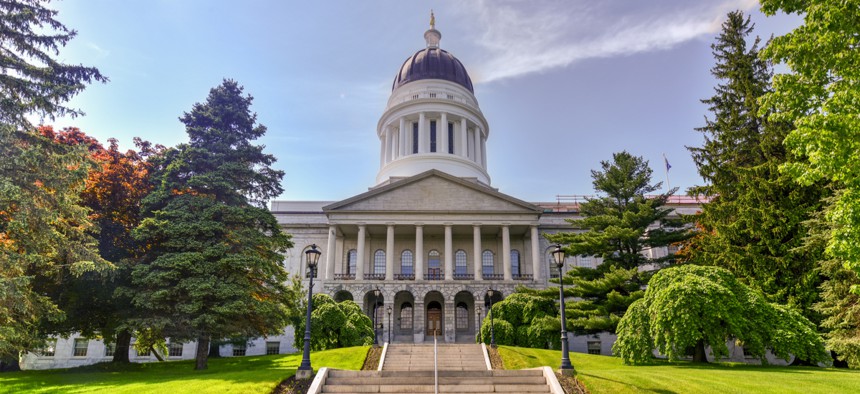Here Are The Medicaid Stories You Should Be Watching

The Maine State Capitol in Augusta. Shutterstock
A Medicaid expansion by ballot measure in Maine, the looming cliff in Puerto Rico and news from Utah and Wisconsin.
Congressional efforts to repeal and replace the Affordable Care Act, and roll back that law’s Medicaid expansion have fizzled out—for now. But there is still plenty of Medicaid-related news happening at the state (and territorial) level. Here are a few stories that Route Fifty is following.
Will Maine or Won’t Maine?
Maine’s legislature, which is controlled by Democrats in the House and Republicans in the Senate—by one vote—has tried to expand the state’s Medicaid system five times. Five times, Gov. Paul LePage has shot those votes down.
On Tuesday, Maine’s residents will go to the polls to answer the expansion question for themselves. A "yes" vote on Question 2 on the ballot would require the state government to provide Medicaid through MaineCare for those under the age of 65 who earn less than 138 percent of the federal poverty line—about $28,000 for a family of three.
As many as 70,000 Mainers would gain eligibility if the measure passes. And, if the voters approve, the measure is not subject to the governor’s veto. But, as The New York Times noted, turnout could be the biggest obstacle to Question 2’s success. There are no national or statewide races driving residents to the polls.
Puerto Rico Is in Danger of Falling Off the Cliff
The U.S. commonwealth has struggled for years with shortfalls in funding for its Medicaid program. Because of its status as a territory, rather than a state, Puerto Rico does not receive nearly the same amount of federal support as the states do—in part because the island’s residents do not pay income tax. On average the federal government covers 57 percent of the island’s Medicaid costs.
Hurricane Maria has made the Medicaid funding situation all the more dire. As it currently stands, Puerto Rico’s Medicaid system is set to run out of money to pay providers by early next year, putting the health coverage of up to 900,000 low-income residents in jeopardy and forcing the island to cover all its own costs going forward.
Puerto Rico Gov. Ricardo Rossello has sent requests to Washington asking leaders to step in to waive the territory’s share of the program’s cost and to provide an infusion of $1.6 billion in federal funding per year for the next five years.
According to Reuters, Seema Verma, the head of the Centers for Medicare and Medicaid Services, has said her agency is working on a Medicaid proposal for Puerto Rico, but she could not provide any specific details of the plan.
Waive Away, Utah, Waive Away
For more than a year, Utah has been playing the waiting game when it came to their Medicaid waiver request. The state’s Department of Health first submitted its application to the Centers for Medicare and Medicaid Services in July 2016.
Now, the wait is over. The U.S. Department of Health and Human Services has approved the Utah state government’s plan to expand its Medicaid system to better serve its homeless community. Those who are newly eligible must earn no more than 5 percent of the federal poverty level and must be either deemed chronically homeless or be in the criminal justice system. As many as 6,000 residents will gain coverage.
Lawmakers were pretty excited about the news. Here’s what Utah House Speaker Greg Hughes had to say at the announcement event according to The Salt Lake Tribune: “I wish we were in a concert venue right now. I wish we had horns and music and drums going on. Because I am so happy, so relieved that these waivers—that began in a past administration—have received the green light.”
All for BadgerCare and BadgerCare for All
There’s some potential for health care innovation coming out of Wisconsin by way of the state’s BadgerCare program.
A bill that would allow anyone—regardless of income—to buy into a BadgerCare public option has been put forward by Democrats in the State House of Representatives. The BadgerCare buy-in plan would cost adults about $500 a month and $200 a month for children.
The initiative is similar to another plan that failed earlier this year in Nevada. That bill, dubbed “Sprinklecare” after its primary author State Assembly member Michael Sprinkle, passed both houses of the legislature before being vetoed by Republican Gov. Brian Sandoval.
The BadgerCare for all plan in Wisconsin remains very much a long-shot, but it’s gotten the endorsement from two Democratic candidates for governor.
Quinn Libson is a Staff Correspondent for Government Executive’s Route Fifty based in Washington, D.C.
NEXT STORY: How federal governments can nurture smart city growth






